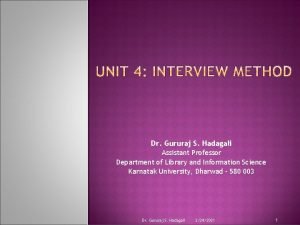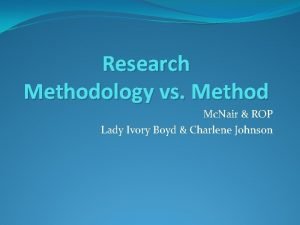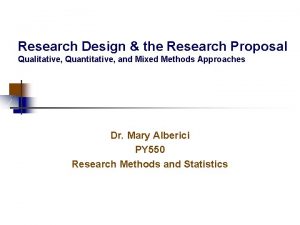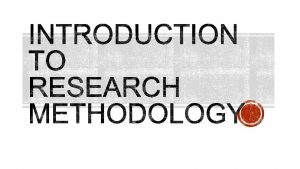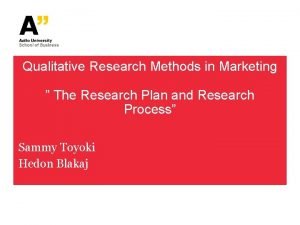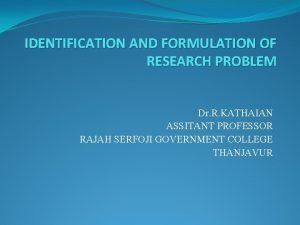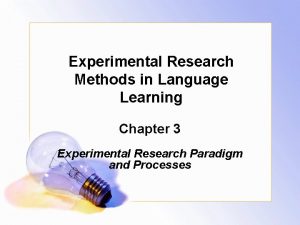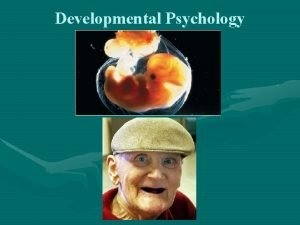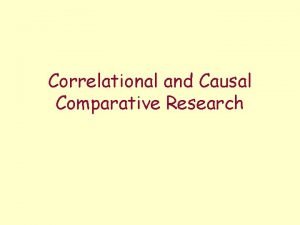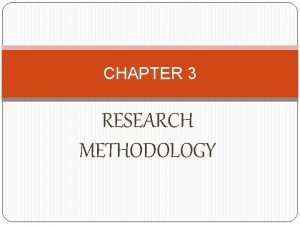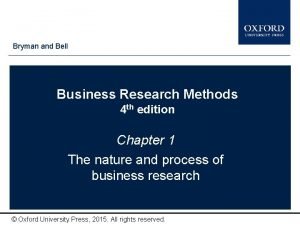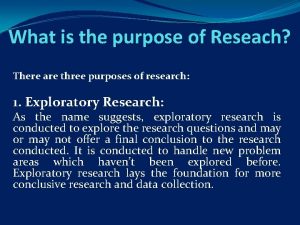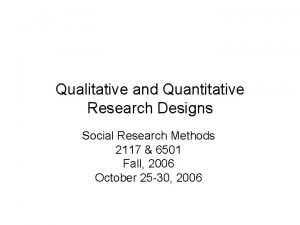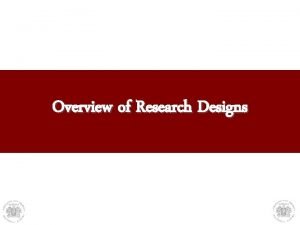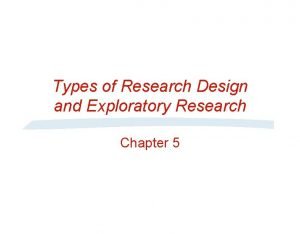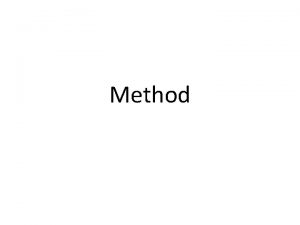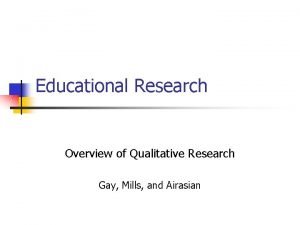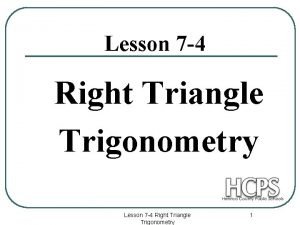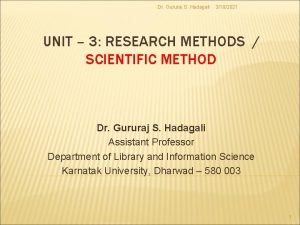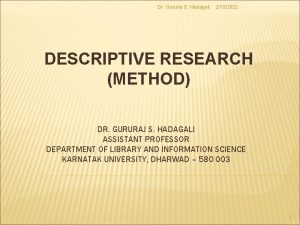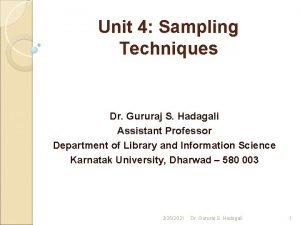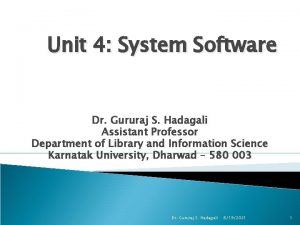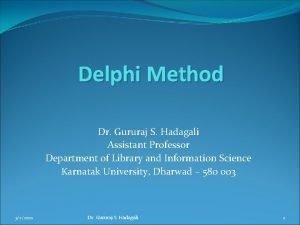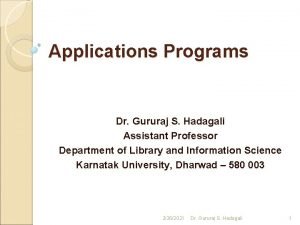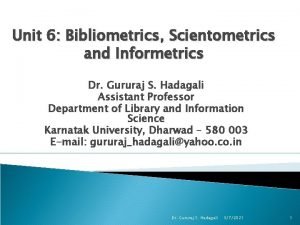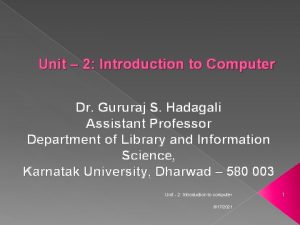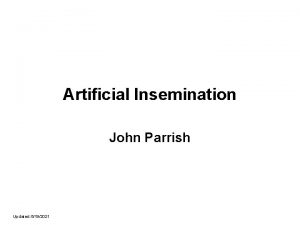Dr Gururaj S Hadagali 5192021 UNIT 3 RESEARCH




























- Slides: 28

Dr. Gururaj S. Hadagali 5/19/2021 UNIT – 3: RESEARCH METHODS / SCIENTIFIC METHOD Dr. Gururaj S. Hadagali Assistant Professor Department of Library and Information Science Karnatak University, Dharwad – 580 003 1

Dr. Gururaj S. Hadagali 5/19/2021 MEANING � Research is a scientific endeavour. It involves scientific method. � ‘The scientific method’ is a systematic step-bystep procedure following the logical processes of reasoning. � Scientific method is a means for gaining knowledge of the universe. � As Karl Pearson emphasizes ‘the scientific method is one and same in all branches and that method of all logically trained minds…. 2

Dr. Gururaj S. Hadagali 5/19/2021 � The facts may be related to any field. It is not the facts themselves which make science but the method by which they are dealt with. � Science is not wrapped up with any particular body of facts. Science is independent of any particular subject matter. 3

Dr. Gururaj S. Hadagali 5/19/2021 � It deals with knowledge of universe for its subject. It does with everything to which its method can be applied. � What makes a science is not, of course, the nature of things with which it is concerned, but the method by which it deals with these things. � Thus, the scientific method does not refer to a field of specific subject of matter, but rather to a procedure or mode of investigation. 4

Dr. Gururaj S. Hadagali 5/19/2021 � It is ‘an objective, logical and systematic method of analysis of phenomena, devised to permit the accumulation of reliable knowledge. � It is a systematized form of analysis… it is characterized by an intellectual attitude. 5

Dr. Gururaj S. Hadagali 5/19/2021 BASIS OF SCIENTIFIC METHOD The scientific method is based on certain ‘articles of faith’ these are: 1. Reliance on empirical evidence: � Truth is established on the basis of evidence. Conclusion is admitted, only when it is based on evidence. � Scientific method involves a systematic process. The answer to a question is not decided by intuition or imagination. 6

Dr. Gururaj S. Hadagali 5/19/2021 � Relevant data are collected through observation or experimentation. � The validity and the reliability of data are checked carefully and the data are analysed thoroughly, using appropriate methods of analysis. � Conclusion is reached on the basis of the result of analysis. 7

Dr. Gururaj S. Hadagali 5/19/2021 2. Use of Relevant Concepts: � We experience a vast number of facts through our senses. Facts are things, which actually exist. � In order to deal with them, we use concepts with specific meanings. Concepts are logical constructs or abstractions created from sense impressions, percepts and experiences. � There are symbols representing the meaning that we hold. We use them in our thinking and communication. � Otherwise clarity and correct understanding cannot be achieved. 8

Dr. Gururaj S. Hadagali 5/19/2021 3. Commitment to Objectivity: � Objectivity is the hallmark of the scientific method. It means forming a judgment upon facts unbiased by personal impressions. � According to Green ‘Objectivity is the willingness and ability to examine evidence dispassionately. � The conclusion should not vary from person to person. It should be the same for all persons. � A person of science must ‘above all things… strive at self-elimination in his judgment and provide an argument which is as true for each individual mind as his own. 9

Dr. Gururaj S. Hadagali 5/19/2021 4. Ethical Neutrality � Science does not pass normative judgment on facts. It does not say that they are good or bad. � As Schroedniger says, ‘Science never imposes anything, science states. Science aims at nothing but making true and adequate statements about its objects. 10

Dr. Gururaj S. Hadagali 5/19/2021 5. Verifiability � The conclusions arrived at by a scientist should be verifiable. He must make known to others how he arrived at his conclusions. � He should thus expose his own methods and conclusions to critical scrutiny. � When others test his conclusion under the same conditions, then it is accepted as correct. 11

Dr. Gururaj S. Hadagali 5/19/2021 � Such verification through replication may either confirm established conclusions or modify them or even invalidate them. � For example, originally an atom was considered to be invisible, but subsequent researches have proved that it is divisible and thus provided the basis for developing atomic energy. 12

Dr. Gururaj S. Hadagali 5/19/2021 6. Logical reasoning process � The scientific method involves the logical process of reasoning. � This reasoning process is used for drawing inference from the finding of a study or for arriving at conclusion. � For example, in a survey of the expenditure pattern on basic necessaries forms a very high proportion of the total expenditure, it is concluded that lower the household income, the higher is the proportion spent on basic necessaries. � The logical reasoning process consists of induction and deduction. 13

Dr. Gururaj S. Hadagali 5/19/2021 INDUCTION � Induction is one of the methods of logical reasoning process. � The inductive method consists of studying several individual cases and drawing a generalization. � Therefore, induction involves two processes – observation and generalization. � Conclusions from induction are tentative inferences and they are subject to further confirmation based on more evidence. 14

Dr. Gururaj S. Hadagali 5/19/2021 WHEN FOLLOWED � This method is followed when new facts are studied. � New truths are uncovered and new generalizations are formulated from a research project. � For example, in a farm management study it is proposed to test the hypothesis. � The application of recommended dosage of chemical fertilizers results in an increase in the yield per hectare. 15

Dr. Gururaj S. Hadagali 5/19/2021 �A sample of experimental farms and control farms is selected in an area. � In the experimental farms, chemical fertilizer is applied and in controlled farms it is not applied, but other conditions – quality of seeds, irrigation, cultural practice, etc. are the same. � After the harvest the average yield per hectare is computed for experimental and control groups and hypothesis is tested. 16

Dr. Gururaj S. Hadagali 5/19/2021 DEDUCTION � Deduction is reasoning process of applying a general accepted principle to a specific individual case falling under the general principle. � It is regarded as reasoning from the general to the particular. � This reasoning establishes a logical relationship between a major premise, a minor premise and a conclusion. 17

Dr. Gururaj S. Hadagali 5/19/2021 �A major premise is a previously established generalization or assumption; a minor premise is a particular case related to the major premise. � The logical relationship of these premises leads to conclusion. E. g. � Major Premise All men are mortal � Minor Premise A is a man � Conclusion A is mortal 18

Dr. Gururaj S. Hadagali 5/19/2021 REQUISITES OF A GOOD SCIENTIFIC METHOD The essential of a good scientific method as summed up by the Advisory Committee on Economic and Social Research of the Council of Social Science Research are: � Careful logical analysis of the problem, separating its elements and whenever possible, formulating hypothesis; � Collection of data pertinent to the problem under study; 19

Dr. Gururaj S. Hadagali 5/19/2021 � Classification of data; � Sound logical reasoning as to the testing of hypothesis and drawing generalizations; � Specific and clear statement of generalizations to facilitate checking and testing by others; 20

Dr. Gururaj S. Hadagali � Complete 5/19/2021 elimination of personal equation; and � Complete and careful reporting of the research process, definitions and the methods of analysis so that others can check the analysis or test the generalizations with new sets of data. 21

Dr. Gururaj S. Hadagali 5/19/2021 THE COMPONENTS OF SCIENTIFIC APPROACH The Scientific approach has two components; the procedural and the personal. � Procedural Component The procedure of scientific method involves the following major steps: � Define the problem; � Establish hypothesis as to causes / explanations / solutions of the problem; � Collect the data; and � Analyse the data to test the hypothesis and draw inferences. 22

Dr. Gururaj S. Hadagali 5/19/2021 � The researcher must have a thorough knowledge of the subject matter of the problem so as to formulate a conceptual model for its study. � He must operationlise the concepts to determine the data requirements. � He must select appropriate methods for collection of data and use relevant statistical techniques and tests for testing hypothesis. � All these steps require creative imagination, extraordinary care and patience. 23

Dr. Gururaj S. Hadagali 5/19/2021 � The researcher’s personal qualities � The researcher’s qualities and attitudes are more important than the procedural steps. � The researcher needs, as rightly emphasized by Eigelberner, ‘the scientific imagination to construct hypothesis, the resourcefulness, manipulative skill and persistence to carry through the experiment, the perspective which distinguishes the essential from the nonessential, and the reasoning which coordinated individual facts into a principle. 24

Dr. Gururaj S. Hadagali 5/19/2021 � He must possess integrity, honesty, sincerity, poise, and perseverance. He must also possess ‘the spirit of independence and the spirit of originality. � In short, a true scientist must possess ‘the devotion of a mother, the poise of a judge, the objectivity of a philosopher, the courage of a soldier, the perseverance and patience of a beaver, the fervour of a patriot and the vision of a prophet. 25

Dr. Gururaj S. Hadagali 5/19/2021 SCIENTIFIC ATTITUDE Above all, the scientific method calls for scientific attitude. The scientific attitude is based on a complexity of elements, viz. � Consistent thinking; � Objective, dispassionate and unbiased devotion to collection and treatment of facts; � Overcoming personal preconceptions and value judgments, because they not only have a distorting effect on the data but are also highly insidious; 26

Dr. Gururaj S. Hadagali 5/19/2021 � Avoiding personal and vested interests – the scientist does not tailor his views to fit preconceived notions or preferences of men in power. � Stubborn determination to analyse one’s own system of thinking and taking nothing for granted without evidence, tests and proofs; � Faith in the universality of cause and effect. Without this faith, a pursuit of scientific knowledge may be flouted whenever it interfaces with special interest or prejudices; 27

Dr. Gururaj S. Hadagali 5/19/2021 � Compassion and understanding – without these knowledge could be dangerous; � Patience and self-control and ability to overcome wishful thinking; and � Keeping an open mind. � All these elements are components of the scientific attitude. These elements tend to correct not only factual error, but also mental and emotional of a research worker. 28
 Gururaj hadagali
Gururaj hadagali Gururaj hadagali
Gururaj hadagali Unit 10, unit 10 review tests, unit 10 general test
Unit 10, unit 10 review tests, unit 10 general test Research report vs research proposal
Research report vs research proposal Method vs methodology
Method vs methodology Ethical considerations examples
Ethical considerations examples Exploratory research and conclusive research
Exploratory research and conclusive research Scope of action research
Scope of action research What is background of the study
What is background of the study Contrast applied research and basic research
Contrast applied research and basic research What is the research problem
What is the research problem Research instrument in experimental research
Research instrument in experimental research Longitudinal research and cross sectional research
Longitudinal research and cross sectional research Causal comparative research design
Causal comparative research design Types of research instruments
Types of research instruments Example of applied research
Example of applied research Basic research vs applied research
Basic research vs applied research Define reseach
Define reseach Quantitative vs. qualitative
Quantitative vs. qualitative What is inquiry in practical research
What is inquiry in practical research Conclusive research
Conclusive research Types of research exploratory descriptive causal
Types of research exploratory descriptive causal Examples of objectives in research
Examples of objectives in research Research instrument in experimental research
Research instrument in experimental research Importance of qualitative research
Importance of qualitative research Level 5 health and social care research project examples
Level 5 health and social care research project examples Cru climate research unit
Cru climate research unit Surplus keuangan adalah
Surplus keuangan adalah Right triangle trigonometry
Right triangle trigonometry
